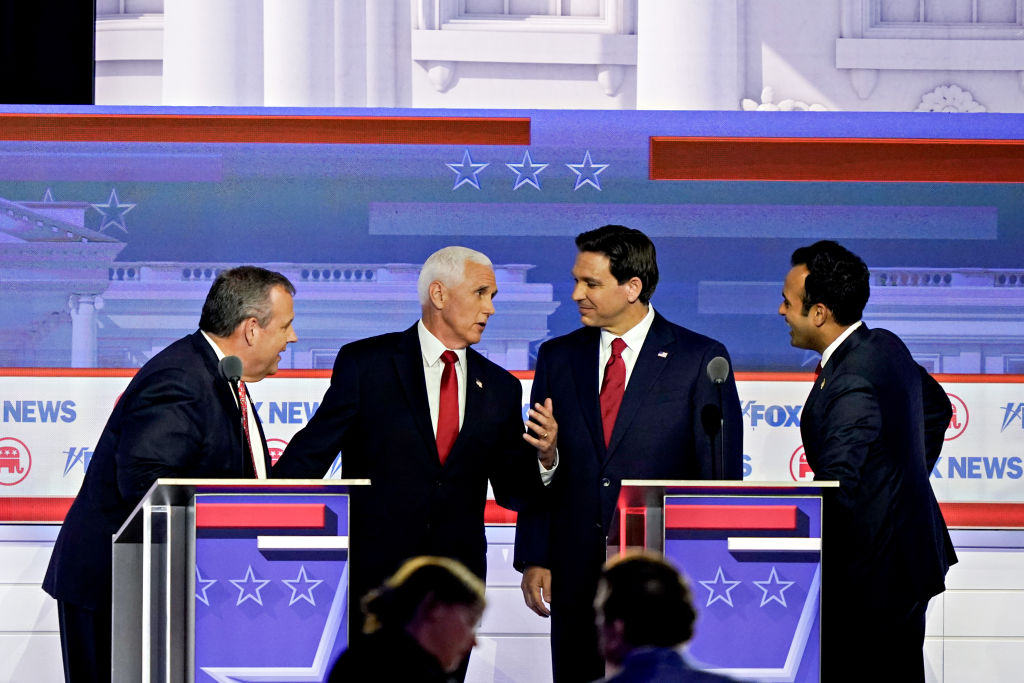
In the year since the Inflation Reduction Act (IRA) became law, I’ve heard versions of the same question keep coming up on the road from people interested in taking advantage of the law’s programs: will the incentives last if Republicans take over?
It’s a good question. The law received zero Republican support in Congress, and, in the past, Republicans have made overturning influential Democratic policies a centerpiece of their agenda, a trend underscored at last week’s Republican presidential debate where leading GOP presidential candidates trashed the Biden Administration’s climate agenda. Entrepreneur-turned-politician Vivek Ramaswamy called the climate agenda the “wet blanket on our economy” and promised a “war” on “toxic regulations.” Former UN Ambassador Nikki Haley said clean technology subsidies just help China. Trump, who wasn’t on stage, made undoing climate rules a priority his first four years in office—and there’s no reason to think his perspective on this issue has changed.
But, despite that fervent opposition, the path to actually wholly undo Biden’s climate agenda would be challenging. That’s in part because the policymaking process doesn't make it easy and also because the policies themselves don’t have a large political constituency opposing them. There is no way, of course, to guarantee anything in the tumultus world of U.S. politics, but right now the smart money is betting that climate policy is here to stay.
At the center of the picture is a simple civics reminder. Passing laws in the U.S. is hard—reversing them can be even harder. To undo the IRA, a future Republican president would need to pass a new law through Congress, presumably requiring GOP control of both the House and Senate. And, even if Republicans controlled the federal government, many in the party might judge that reversing the law is too politically risky. Companies have already invested hundreds of billions of dollars—including in right-leaning communities—on the assumption that they will receive IRA-related incentives. Reversing the law would disrupt investments that constituents can see. Indeed, earlier this year, many Republican representatives with clean technology investments in their districts balked at their colleagues’ attempt to nix IRA subsidies as part of negotiations over the debt ceiling. (At the time, some Republicans said that such a maneuver wouldn’t actually have the GOP votes to become law).
At the same time, many Republicans may not see as much political upside in a reversal. Polling shows that most voters don’t know much about the IRA, and conservative activists aren’t passionately protesting it. Some corporate trade groups opposed its original passage, but mostly because of its corporate tax provisions rather than its clean energy subsidies. That’s a sharp contrast with past policies that have drawn Republican ire, including most notably Obama’s Affordable Care Act. That law served as a political lighting rod and drew conservative ire from the moment it passed in 2010. Republicans fought it for a decade, at least in part because it gave them a good political talking point. Even then, despite at times controlling both houses of Congress and the presidency, they couldn’t muster the votes to undo it.
None of this is to say that a Republican presidency would have no effect on climate policy. It’s easy to imagine a future president nixing Biden’s executive order requiring the federal government to factor in environmental justice considerations in the implementation of climate policy, for example. Moreover, federal agencies directed by the White House are responsible for actually implementing the IRA, and a future administration could try to chip away at the law at the margins: in its implementation—though such a maneuver would be subject to time-consuming litigation.
Indeed, any attempt to undo the law would likely drag out for months or years, which is another reason to be skeptical of the success of such a move. At the core of the IRA is a program of subsidies and incentives scheduled to last 10 years. Each year that passes, the law will distribute billions more in subsidies that cannot be clawed back, and every one of those dollars spent accelerates the U.S. transition to a low-carbon economy. The market seems to agree with the assessment that the law is here to stay. Companies are investing billions in projects in a range of technologies, from solar manufacturing to hydrogen infrastructure, that, in many cases, require subsidies to be profitable.
The result of all this investment is that the economy is transforming around us—regardless of Republican talking points. No matter what happens in a future administration, that transformation will not be reversed.
More Must-Reads From TIME
- The 100 Most Influential People of 2024
- How Far Trump Would Go
- Scenes From Pro-Palestinian Encampments Across U.S. Universities
- Saving Seconds Is Better Than Hours
- Why Your Breakfast Should Start with a Vegetable
- 6 Compliments That Land Every Time
- Welcome to the Golden Age of Ryan Gosling
- Want Weekly Recs on What to Watch, Read, and More? Sign Up for Worth Your Time
Write to Justin Worland at justin.worland@time.com